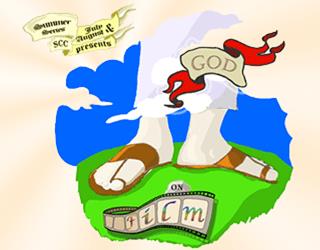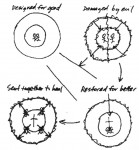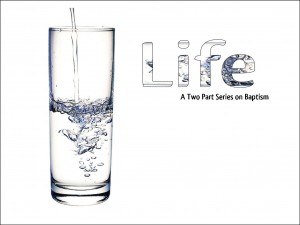
.
.
.
.
From Neighbors to Family
Sycamore Creek Church &
Mt Hope United Methodist Church
Valhalla Park June 26, 2016
Tom Arthur
Peace family!
Today we’re baptizing many people. What exactly is baptism? In our baptism we move from being neighbors to being family. Baptism is more than just a public profession of faith. Baptism is entrance into the family of God.
Peter, one of Jesus’ closest friends, was preaching to Jerusalem shortly after Jesus’ death, resurrection, and ascension. He apparently preached a pretty good sermon because this is how it ended:
Peter replied, “Each of you must repent of your sins and turn to God, and be baptized in the name of Jesus Christ for the forgiveness of your sins. Then you will receive the gift of the Holy Spirit. This promise is to you, to your children, and to those far away—all who have been called by the Lord our God.” Then Peter continued preaching for a long time, strongly urging all his listeners, “Save yourselves from this crooked generation!”
Those who believed what Peter said were baptized and added to the church that day—about 3,000 in all.
~Acts 2:38-41 NLT
Those who were baptized that day were “added to the church.” They became part of the church. The Church is the community of friends who are together following Jesus. The church is the family of God. Let’s unpack how the waters of baptism join us to the church, the family of God.
- Water = Family/Community
What do these cities have in common: Lansing, Grand Ledge, Portland, Ionia, Saranac, Lowell, Grand Rapids, Grandville, and Grand Haven? They all are found on the banks of the Grand River. Water is community. Communities of people always gather along the banks of a water source. Whether it’s families at the beach, villages around a well, or towns along a river, water is community. And the waters of baptism are where the community that is the family of God gather. When you are baptized you enter into the family of God.
- Water = Birth into a family
Water also plays a significant part in birth. Think about the waters of the womb or “water breaking.” I asked my mom friends on Facebook when their water broke. Some had it break in the hospital. Others had their doctor or midwife break their water. Some in the bathroom. Some in bed. One was at an MSU basketball game on senior night at halftime!
At some point all of us, whether we’re moms or dads or not, were born in water. In the waters of our mother’s womb. The waters of the womb provide nutrients necessary for babies to grow. They include stem-cells which develop into different parts of the body. The waters in our mother’s womb allowed movement and development of skin, muscles, and bones. The waters increase in volume as the baby grows. They keep the baby at the right temperature. The waters of the womb provide protection and cushion for the baby. In the same way that we were all born in the waters of our mother’s womb, each of us is born into God’s family through the waters of baptism. You might call baptism the “womb of God.”
In baptism we begin to receive what we need to grow in love. In baptism we begin to find our part in the body of Christ. In baptism we begin to develop into all that God has called and created us to become. In baptism God’s grace begins to grow to meet us where we are. In baptism we are protected. As Ryan Chorpenning said when he was baptized, “I’ve been a licensed life guard since age 16. I’ve always guarded other people. I now need someone to guard me.”
Baptism is the “womb of God.” In baptism we are born into the family of God.
- Water = Cleansing & Forgiveness
Family is a nice idea, isn’t it? Well, yes and no. Families are kinda messed up, aren’t they? Everyone wants a family, just not the one they’ve got. My family is kinda messed up. I’m part of the problem. All of us are. I have a brother who my family hadn’t seen in many many years. Maybe fifteen years. He had gotten into drugs and alcohol and generally had a hard time making life work. He left the family. A couple of months ago I began to feel really convicted that we weren’t trying to find him. So I began to look. Through a unique series of events, we found him and reconnected with him. When I met with him last, he grabbed my hand and looked me in the eye and said, “Tom, I’m sorry for not being a very good brother. Forgive me.” Of course I did. Then I looked him in the face and said, “Dan, I took too long to seek you out. Please forgive me.” It was a beautiful moment of forgiveness in the midst of the mess of family.
Forgiveness is the glue that holds families together. Forgiveness has two parts: confession and forgiveness. My oldest son broke a serving spoon while using it as a drumstick with his drums. He brought it to my wife and said he was sorry. He kept saying he was sorry. Then eventually he added, “I forgive you.” #micahsayings. He intuitively understood that confession and forgiveness go hand in hand. We confess. Then we forgive. Kids are so instructive in the basics of family life. I have another younger son, Sam. He and Micah had this exchange one day.
Sam: Micah knocked down my chocho train.
Micah: I was angry.
Me: It’s not a good idea to knock things down when you’re angry.
Micah: I’m sorry Sam. Will you forgive me?
Sam: Yes…You knocked down my chocho train!
#samsayings
Sam had the mechanics down of what to say, but not quite the spirit of the whole thing. Confession and forgiveness go hand in hand. There are two kinds of forgiveness that we all need: forgiveness between people and forgiveness between God and people. Both include confession and forgiveness. When we confess to God, God forgives us. No matter how messed up we are or how messed up our actions are. Sister Helen Prejean, spiritual advisor to Elmo “Pat” Sonnier who was convicted of rape and murder of two teenagers, said, “Everyone is worth more than the worst thing we’ve done.” One of the people I baptized in the past was struggling with his past and some of the things he did while in the military. He said at his baptism, “After 41 years of trying to figure out why God would forgive me when I can’t forgive myself, I’ve decided that it doesn’t matter what I think. It only matters what God thinks.”
We all know what it’s like to wash our hands and bodies in water. I go to the gym and come back all smelly. I jump in the shower and stand under the water. I come out clean and new. My kids play in the dirt (why can’t they just play in the sand). They get dirt everywhere. Fingers. Toes. Hands. Face. We go inside and wash it all away with water. Water cleanses us. The waters of baptism cleanse us too. In baptism we bring all our messiness and all our dirt and God washes it away. We confess to the ways we haven’t lived up to our own standards let alone God’s. And then God receives that confession and forgives us. He forgives us because of what his son, Jesus, has done for us. In Jesus’ life, death, and resurrection we are freed from our bondage, healed of our brokenness, and forgiven of our guilt. We are washed clean. Baptism is washing. Baptism is forgiveness. Baptism is the forgiveness of family. God’s family.
Friends, today those who are being baptized are no longer just our neighbors. They are our family. They join the family of God.
To the parents and candidates
Tom: Do you seek to avoid evil and do good?
Parents/Candidates: I do.
Tom: Do you confess Jesus as Savior and Lord in community with the church?
Parents/Candidates: I do.
Tom: Will you stay in love with God?
Parents/Candidates: By God’s grace, I will
Tom: Do you believe in God?
Parents/Candidates:
I believe in God, the Father almighty, Creator of heaven and earth.
Tom: Do you believe in Jesus Christ?
I believe in Jesus Christ, His only Son, our Lord.
He was conceived by the power of the Holy Spirit and born of the Virgin Mary.
He suffered under Pontius Pilate, was crucified, died, and was buried.
He descended to the dead.
On the third day He rose again.
He ascended into heaven, and is seated at the right hand of the Father.
He will come again to judge the living and the dead.
Tom: Do you believe in the Holy Spirit?
I believe in the Holy Spirit,
the holy Catholic Church,
the communion of saints,
the forgiveness of sins,
the resurrection of the body,
and life everlasting. Amen.
To parents
Tom: Will you along with the church nurture these children by teaching and example guiding them to accept God’s grace for themselves when they are able?
Parents: I will.
To the church
Tom: Do you as the body of Christ, the church, reaffirm your own desire to avoid evil and commit to Christ by doing good? If so, say “We do.”
Church: We do.
Tom: Will you nurture one another, these children, teenagers, and adults in the Christian faith and life, and surround them with a community of love and forgiveness? If so, say “We will.”
Church: We will.
Confirmation (for those reaffirming their faith) & Anointing with Oil
When they come up out of the water…
Tom: NAME, the Lord defend you with his heavenly grace and by his Spirit confirm you in the faith and fellowship of all true disciples of Jesus Christ.
or
The Lord bless you, and keep you;
The Lord make his face to shine upon you, and be gracious to you.
The Lord lift up His countenance upon you,
and give you peace. Numbers 6: 24-26
Congregational Remembrance
Tom: Friends, remember your baptism and be thankful.









Recent Comments